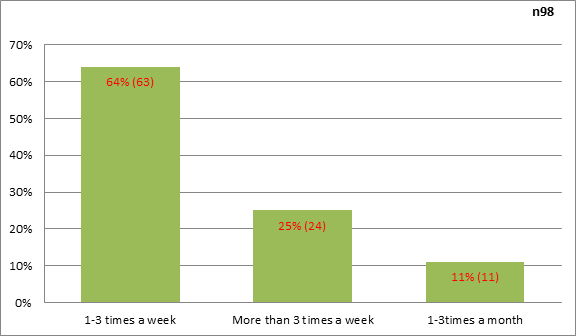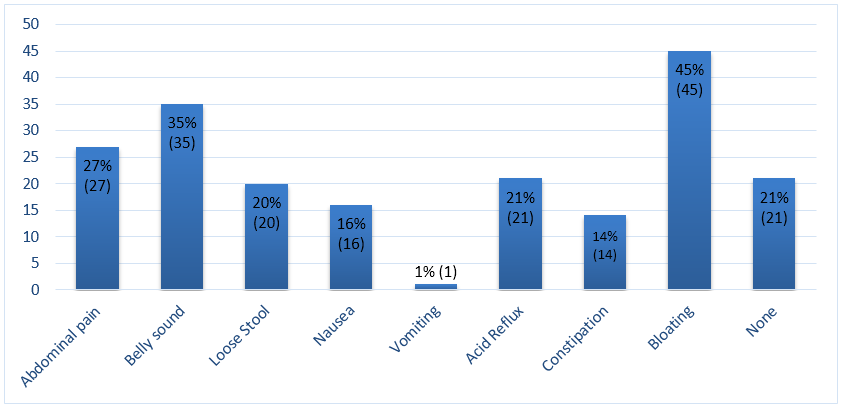Research Article
Volume 2 Issue 3 - 2018
Effect of Fast Food Consumption on the Gastrointestinal System
1Medical students in Royal College of Surgeons (RCSI) Bahrain
2Professor of Family Medicine, Imperial College London & former Chair; Dept. of Family & Community Medicine, Arabian Gulf University, Bahrain
2Professor of Family Medicine, Imperial College London & former Chair; Dept. of Family & Community Medicine, Arabian Gulf University, Bahrain
*Corresponding Author: Alnasir Faisal, Professor of Family Medicine, Imperial College London & former Chair; Dept. of Family &
Community Medicine, Arabian Gulf University, Bahrain.
Received: August 21, 2018; Published: September 15, 2018
Abstract
Objective: Fast food is very popular, especially among college students. It is hypothesized that fast food consumption has adverse effects on the gastrointestinal system. This study was implemented to find out if there is any relationship between eating fast food and developing gastrointestinal problems, and ultimately it aims to increase the level of public awareness to have a healthy lifestyle.
Design and setting: A cross-sectional study was conducted on the Royal College of Surgeons (RCSI) medical students from all levels (year1to 5) during a two months period in 2016.
Method: To all the 860 students who were registered in RCSI, a predesigned self-administered questionnaire was sent by email. A period of two days was set to receive back the completed questionnaire. Those who answered within that period were considered as the random sample. One hundred and fourteen students responded, of which 14 were excluded due to various reasons that will be stated later, making the total studied sample 100 students. The questionnaire consisted of multiple sections that include demographic characteristics, a section inquiring about the behavior of fast food consumption and another for information related few gastrointestinal signs and symptoms.
Results: Information from the collected questionnaires was analyzed using SPSS program version 21. The sample consisted of Bahraini and non-Bahraini students whom their ages ranged between 17 to 25 years, 56(56%) females, 43(43%) male and 1(1%) did not answer. Fifty-seven (57%) lived with their families while the remaining were either international students or Bahraini living in the hostel. From those who think that fast food is harmful to their heath, 20% of the students were in the Foundation level, 36% in the pre-clinical, and 37% in the clinical years. The results showed that there is a significant relationship between gender and place of residence with gastrointestinal disturbance (P< 0.046 and P< 0.018). Females and those living away from their families experience more GIT symptoms (57.1% of females and 62.8%), despite that male and those who are living with their families consumed more fast food than the others. The study did not find any significant relationship between eating fast food and developing gastrointestinal disturbances (P < 0.511).
Conclusion: Consumption of fast food was found to have no significant effect on the gastrointestinal system.
Key Words: Fast food; Medical Students; Gastrointestinal Disturbance
Introduction
Fast food is very popular, especially among school and college students. Many studies reported the relationship between an ill health effect and the regular consumption of fast food. A study conducted on 735 secondary school students in Bahrain during 2011 found that the Bahraini populations, in general, are not following healthy lifestyles [1]. It is reported that there is a strong relationship between gastroesophageal reflux diseases (GERD) and functional dyspepsia eating habits [2]. In self-reporting survey assessing fast food consumption, it was found that fast food is related to metabolic syndrome biomarkers for chronic disease [3]. An outbreak of hemorrhagic colitis with the isolation of rare type of E-Coli, E-Coli O157: H7 was documented after eating from a fast food restaurant [4].
Moreover, body weight changes are markedly affected by fast food leading to overweight and obesity. Currie, Janet., et al. in their study reported that such weight gain is mainly related to the high-calorie intake and content of the fast food [5]. It is also reported that fast food eating increases the risk of Type 2 diabetes, cardiovascular problems, mortality, and depressive symptoms [6]. This study was implemented among medical students to find out whether there are any relationships between developing gastrointestinal upset and regular fast food eating. It was hypothesized that there is a positive correlation.
Methodology
This cross-sectional study was conducted on medical students studying Royal College of Surgeon Ireland (RCSI) in Bahrain in all academic years. An informative email including a consent letter and an electronic format of a pre-designed self-administered questionnaire was sent to the entire population of medical students. A time rame of two days was set for receiving the responses using the Survey Monkey program for distribution of the questionnaire. The questionnaire was designed into three main areas to obtain information about demographic characteristics of the sample population, their pattern of fast food consumption, and medical problems associated with gastrointestinal symptoms.
A pilot study was done to test the questionnaire and the logistics related to its distribution; later few questions were amended. The study was implemented on 1st of March 2016 and the information received was analyzed using SPSS program version 21. A P-value of <0.05 was considered to be significant.
The questionnaires were distributed randomly to the students excluding those students with physical disability and a coexisting illness. The total student population size of the RCSI medical students was 860 of whom only 114 (13.26%) students replied within the specified duration making the response rate only 13%. Later 14 questionnaires were excluded because the respondents were the exclusion criteria or their questionnaires were not complete. The final sample size came to be 100 students, (11.6% out of the total number of students in the medical school).
Ethical considerations
Ethical approval for conducting the study was granted by the Research & Ethics Committee of the RCSI and consent was taken from the students. Also, all possible measures were taken to obscure the students' identities and to maintain the confidentiality of the gathered information. The questionnaires were shredded and carefully discarded after the information was stored in the computers.
Ethical approval for conducting the study was granted by the Research & Ethics Committee of the RCSI and consent was taken from the students. Also, all possible measures were taken to obscure the students' identities and to maintain the confidentiality of the gathered information. The questionnaires were shredded and carefully discarded after the information was stored in the computers.
Results
Out of the total 860 students, 114 responded (13%) but, 14 were excluded because of the exclusion criteria and incomplete questionnaire, making the final sample size to 100. Their ages ranged between 17 and 25 years with a mean age of 20.2 years. Female students constituted 56% (56) while 43% (43) were males and 1% (1) did not respond.
Fifty-seven percent (57) of the students lived with their families while 43% (43) lived apart from their families (they were either international students or Bahraini living in the hostel). The sample population was divided into two groups according to the mean age: 20 years and above constituted 60% (60), and those below 20 years old were 40% (40) of the students. Although it is not significant, it was found that out of the first group, 50% (30 students) complained of GIT disturbance in comparison to 45% (18 students) who did not.
When asked about eating fast food it was found that 98(98%) students do eat fast food and only two female students (2%) never eat it. 64%(63) of those who eat fast food did it once to three times a week and a 25% (24) eat fast food more than three times a week (Figure 1). With regards to the type of fast food, it was as found: 79% ate burgers, 75% pizza, 73% fries, 68% pasta, and 63% is shawarma.
The students were asked to mention their reasons for having fast food and also to state their opinion regarding the relationship between fast food and health. For these questions, the participants had the option of choosing more than one answer. Hence, the total responses add up to more than 100%. The results were as follows: 60% of the students said, "They had no time for cooking," 56% stated, "because they usually eating with their friends who like fast food" and 49% stated, "They do it because of they just like fast food." Few students reported, "They eat fast food because of stress or other private reasons."
When assessing the students' opinions about fast food, the majority, 93%, thought that fast food is harmful to their health. And, when asked about their plan, 44% believed that they will stop having fast food sometimes in the future.
Students were considered to have GIT disturbances if they had 2 or more of list GIT symptoms in the questionnaire (Figure 2). Forty-seven (48%) of the participants had GIT disturbance, in comparison to 51 (52%) who did not have it.
A trial was made to find out whether the educational level (year) of the students was related to the development of GIT disturbance. The students were grouped into three categories: foundation year (20%), the pre-clinical years (36%), and the clinical years (37%) students (7 students did not answer this question). It was found that 21 (23.9%) of the foundation year students, 35 (32.6%) of the pre-clinical, and 37 (43.5%) of clinical year students complained of GIT disturbances after eating fast food. However, this finding was not statistically significant.
When relating the frequency of eating fast food with the development of GIT disturbance, it was found that out of the 11 who ate fast food for 1-3 times a month, 45.5% (5) got GIT disturbances. While out of the 63 who eat fast food up-to three times a week, 52.4% (33) got GIT disturbance, and 42% (10) out of the 24 who ate fast food for more than three times a week got GIT disturbance. Again, such finding was not statistically significant (p < 0.433) indicating no relationship between the number of times consuming fast food and the development of GIT disturbance.
There was a significant relationship (P < 0.018) between where the students live (residence) and the development of GIT disturbances; 36.8% (21) out of the 57 who were living with their family got GIT disturbances in comparison to 63% (27) of the 43 who were living alone or in the hostel developed GIT disturbance (Table 1).
| Living with the family or not | Development of GIT disturbance | Total | |
| No | Yes | ||
| With family | 36 | 21 | 57 |
| 63.2% | 36.8% | 100.0% | |
| Without family | 16 | 27 | 43 |
| 37.2% | 62.8% | 100.0% | |
| Total | 52 | 48 | 100 |
| 52.0% | 48.0% | 100.0% | |
Table 1: Relation between where the students were living and the development of GIT disturbance.
n100
n100
Discussion
There limited studies about the relationships between fast food consumption and the development of gastrointestinal disturbance, which made it difficult for the comparison of our results with other studies. Gender and where students stay was found to be significantly related to fast food consumption. Although males were more indulged in fast food, they complain less of GIT disturbance. It is presumed that the high percentage of female developing GIT disturbance was due to the fact that many of them were not Bahraini, hence, were living away from their parents in the hostels.
For that, they depend on eating from the outside and not home cooked food. It is well known that female students spend much time in the study aiming for a high educational attainment. They also undergo more psychological stress when living away from their families and have more probability to perceive symptoms from various illnesses. A similar finding was reported indicating women being more being ill than men. It was also found that they pay more attention to their symptoms than men [7]. Other studies have shown that women also, suffer more from depression and stress than men [8]. Such psychological pressure often leads women to perceive more symptoms and have more complaints than men. On another note, their menstrual cycles could be a contributing factor to their GIT symptoms.
GIT disturbances were also found to be related to the place of residence, despite the finding that those who lived with their families ate more fast food than the others and complained less of GIT disturbance. A study in 2016 reported that expatriates usually suffer more from depression, feeling sick, and anxiety which could be due to separation from family and friends, and hence, they may be more prone to neglect their health leading to getting more illness and having higher perceptions of symptoms [9,10].
No significant relationship was found between the frequency of consuming fast food and GIT disturbance. On the contrary, it was found that those who ate fast food the most were the least to get symptoms. A similar finding was reported by Pietrangelo and Carey [11]. They could not find any relationship between the frequency of eating fast food and the development of GIT disturbances.
No significant relationship was found between the frequency of consuming fast food and GIT disturbance. On the contrary, it was found that those who ate fast food the most were the least to get symptoms. A similar finding was reported by Pietrangelo and Carey [11]. They could not find any relationship between the frequency of eating fast food and the development of GIT disturbances.
Conclusion
The study did not find any relationship between eating fast food and the development of gastrointestinal disturbance.
Limitations
The small sample size was a limitation against generalization of the findings of our study as due to many factors larger size could not be recruited.
The small sample size was a limitation against generalization of the findings of our study as due to many factors larger size could not be recruited.
References
- Musaiger A., et al. “Dietary and lifestyle habits amongst adolescents in Bahrain”. Food & Nutrition Research 55.10 (2011).
- Chirila I., et al. “The role of diet in the overlap between gastroesophageal reflux disease and functional dyspepsia”. The Turkish Journal of Gastroenterology 27.1 (2016): 73-80.
- Marlatt K., et al. “Breakfast and fast food consumption are associated with selected biomarkers in adolescents”. Preventive Medicine Reports (2016): 49-52.
- Riley L W., et al. “Haemorrhagic colitis associated with a rare Escherichia coli serotype”. The New England Journal of Medicine 308.12 (1983): 681-685.
- Currie J., et al. "The Effect of Fast Food Restaurants on Obesity and Weight Gain". American Economic Journal: Economic Policy (2010): 32-63.
- El Ansari W., et al. “Food and mental health: relationship between food and perceived stress and depressive symptoms among university students in the United Kingdom”. Central European Journal of Public Health 22.2 (2014): 90-97.
- Verbrugge LM. “Multiple Roles and Physical Health of Women and Men”. Journal of Health and Social Behavior 24.1 (1983): 16-30.
- Matud MP. “Gender differences in stress and coping styles”. Personality and Individual Differences 37.7 (2004): 1401-1415.
- Expats and Mental Health". William Russell". William R-russell Ltdl.com. 2015. Web. 11 Apr. (2016).
- Alnasir Faisal "Health of Migrant Workers; A Matter of Concern". Middle-East Journal of Family Medicine (2015): 41-45.
- Pietrangelo A and Carey E. "13 Effects of Fast Food on the Body.
Citation:
Alnasir Faisal., et al. “Effect of Fast Food Consumption on the Gastrointestinal System”. Medical Research and Clinical Case
Reports 2.3 (2018): 236-241.
Copyright: © 2018Alnasir Faisal., et al. This is an open-access article distributed under the terms of the Creative Commons Attribution License, which permits unrestricted use, distribution, and reproduction in any medium, provided the original author and source are credited.





































 Scientia Ricerca is licensed and content of this site is available under a Creative Commons Attribution 4.0 International License.
Scientia Ricerca is licensed and content of this site is available under a Creative Commons Attribution 4.0 International License.